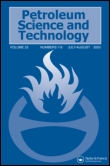 The publishers of the journal Petroleum Science and Technology have retracted a paper because one of the authors “did not agree to co-author this manuscript,” and did not even communicate with the other three authors.
The publishers of the journal Petroleum Science and Technology have retracted a paper because one of the authors “did not agree to co-author this manuscript,” and did not even communicate with the other three authors.
According to one involved party, the problem is bigger than just lack of communication: The paper, “Fatigue and Low Temperature Fracture in Bitumen Mastic,” authored by a dean of civil engineering in Iran, was “copied word for word” from a Canadian student’s master thesis, according to the student’s advisor.
Three of the authors on the paper are engineers at the Shahid Rajaee Teacher Training University in Tehran, Iran, including the dean of civil engineering, Saeed Ghaffarpour Jahromi. The fourth author, B. J. Smith, is listed as a member of the Department of Chemistry at Queen’s University in Kingston, Ontario.
After some digging, it turns out B. J. Smith is Benjamin James Smith, a master’s student in the lab of chemist Simon Hesp at Queen’s from 1998 to 2000—thirteen years before the PST paper was published.
We reached out to Hesp, who said he came across the PST paper in the literature, and realized it “was copied word for word from Ben’s thesis and one or more of our papers,” so he asked that the paper be retracted.
The paper abstract, via ResearchGate:
The authors investigate the effect of filler particle size on the fatigue and low-temperature toughening mechanisms in bitumen mastics and polymer modified bitumen by using glass spheres and limestone filler with sufficiently different gradations. The fatigue performance of the mastics is investigated under constant torsional strain. Interfacial adhesion between polymer-modified bitumen and filler particles increases fatigue life. Crack healing was examined during prolonged rest periods following fatigue damage. Thermal stress restrained specimen tests on bitumen mastics indicate that particle size does not influence the failure stress or failure temperature.
Compare that to the abstract of Smith’s 2000 thesis:
This thesis examines the effect of filler particle size on the fatigue and low-temperature toughening mechanisms in asphalt mastics and mixtures. Model mastic systems were prepared containing glass spheres and limestone filler with significantly different gradations. Asphalt mixtures containing regular and coarse limestone filler were also studied. The fatigue performance of the asphalt systems was investigated under constant torsional strain conditions using a dynamic mechanical rheometer. A larger number of advancing microcracks become ‘pinned’ in the asphalt mastics containing finer dispersions of filler, resulting in improved resistance to fatigue crack propagation. Interfacial adhesion between polymer-modified bitumen and filler particles results in a 40% increase in fatigue life. Reduced particle-matrix debonding and increased shear yielding ahead of the crack tip contributes to this improvement. Asphalt mixtures containing finer distributions of filler also exhibited enhanced fatigue properties. Crack healing was examined during prolonged rests periods following fatigue damage. Stiffness recovery is more rapid in mastics containing coarse filler, although this does not translate into a significant recovery in fatigue life. Crack healing in asphalt mixtures containing significantly different gradations of filler was similar. Thermal stress restrained specimen tests on asphalt mastic systems indicate that particle size does not influence the failure stress or failure temperature. Results suggest that crack tip blunting contributes to the low-temperature toughening of these materials. Time-to failure tests on asphalt mixtures also show no difference in low-temperature performance between samples containing different sized filler. This research provides evidence that crack pinning is a toughening mechanism in these asphalt systems, although additional shear yielding mechanisms also contribute to cracking resistance.
Here’s the full statement of retraction:
Taylor & Francis is retracting the paper entitled “Fatigue and Low Temperature Fracture in Bitumen Mastic,” by S. Ghaffarpour Jahromi, S. Vossough, B. Andalibizade & B. J. Smith, published in Petroleum Science and Technology, Volume 32, Issue 3, pages 267-273. Upon investigation, it was determined that B. J. Smith did not agree to co-author this manuscript, nor did B. J. Smith communicate with S. G. Jahromi or the other co-authors.
As a result, the article published in Petroleum Science and Technology has been retracted and should not be cited in the electronic or print version of the journal.
The paper has yet to be cited, according to Thomson Scientific’s Web of Knowledge.
We haven’t been able to find contact information for Benjamin Smith, but we’ve reached out to first author Jahromi and PST editor-in-chief James Speight to comment. We’ll update if we hear back.
Hat Tip: Rolf Degen
Like Retraction Watch? Consider supporting our growth. You can also follow us on Twitter, like us on Facebook, add us to your RSS reader, and sign up on our homepage for an email every time there’s a new post.
The incredible lengths some journals will go to to avoid saying “plagiarism”!
Apparently it’s only plagiarism if the victim doesn’t agree to co-author the manuscript. Apparently they asked him to let them quote him word for word and he turned them down. That’s his loss, seeing as he only got a master’s thesis out of it instead of a publication in the magisterial “Petroleum Science and Technology.” He could have been published!